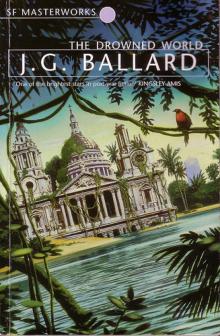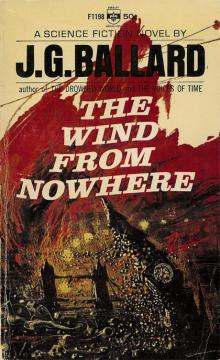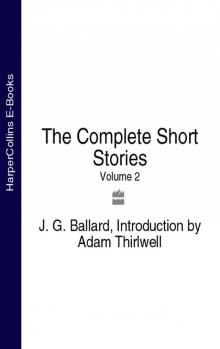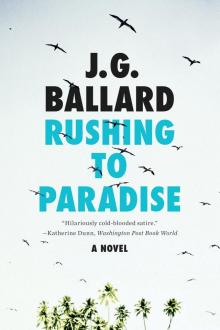- Home
- J. G. Ballard
The Complete Short Stories, Volume 2
The Complete Short Stories, Volume 2 Read online
From the reviews of The Complete Short Stories :
‘This marvellous, inexhaustible book is a monument at the end of fertile lands … Ballard is a superb writer; few could publish a book of this size which is never boring, where the invention never flags. Unfailingly ingenious and perverse’
PHILIP HENSHER, Daily Telegraph
‘A feast, and not only for those who think – as I do – that Ballard has long been Britain’s most original and inventive writer. For anyone bored with the stale conventions of mainstream fiction, his stories of stilled time, desolate beauty and personal fulfilment in extreme situations will be sheer delight’
JOHN GRAY, New Statesman
‘[J.G. Ballard has] one of the most haunting, cogent and individual imaginations in contemporary literature’
WILLIAM BOYD, Mail on Sunday
‘Thank God for J.G. Ballard and his short stories in which wonder and awe never fade. It is no exaggeration to say that Ballard’s stories are beyond compare. This is a collection of tales and fables to be savoured by admirers and newcomers alike’
ROBERT EDRIC, Spectator
‘This collection is essential for anyone who cares about contemporary fiction’
Observer
Contents
Cover
Title Page
Introduction
Prisoner of the Coral Deep
The Lost Leonardo
The Terminal Beach
The Illuminated Man
The Delta at Sunset
The Drowned Giant
The Gioconda of the Twilight Noon
The Volcano Dances
The Beach Murders
The Day of Forever
The Impossible Man
Storm-Bird, Storm-Dreamer
Tomorrow is a Million Years
The Assassination of John Fitzgerald Kennedy Considered as a Downhill Motor Race
Cry Hope, Cry Fury!
The Recognition
The Cloud-Sculptors of Coral D
Why I Want to Fuck Ronald Reagan
The Dead Astronaut
The Comsat Angels
The Killing Ground
A Place and a Time to Die
Say Goodbye to the Wind
The Greatest Television Show on Earth
My Dream of Flying to Wake Island
The Air Disaster
Low-Flying Aircraft
The Life and Death of God
Notes Towards a Mental Breakdown
The 60 Minute Zoom
The Smile
The Dead Time
The Index
The Intensive Care Unit
Theatre of War
Having a Wonderful Time
One Afternoon at Utah Beach
Zodiac 2000
Motel Architecture
A Host of Furious Fancies
News from the Sun
Memories of the Space Age
Myths of the Near Future
Report on an Unidentified Space Station
The Object of the Attack
Answers to a Questionnaire
The Man Who Walked on the Moon
The Secret History of World War 3
Love in a Colder Climate
The Enormous Space
The Largest Theme Park in the World
War Fever
Dream Cargoes
A Guide to Virtual Death
The Message from Mars
Report from an Obscure Planet
Keep Reading
About the Author
Copyright
About the Publisher
INTRODUCTION
Short stories are the loose change in the treasury of fiction, easily ignored beside the wealth of novels available, an over-valued currency that often turns out to be counterfeit. At its best, in Borges, Ray Bradbury and Edgar Allan Poe, the short story is coined from precious metal, a glint of gold that will glow for ever in the deep purse of your imagination.
Short stories have always been important to me. I like their snapshot quality, their ability to focus intensely on a single subject. They’re also a useful way of trying out the ideas later developed at novel length. Almost all my novels were first hinted at in short stories, and readers of The Crystal World, Crash and Empire of the Sun will find their seeds germinating somewhere in this collection.
When I started writing, fifty years ago, short stories were immensely popular with readers, and some newspapers printed a new short story every day. Sadly, I think that people at present have lost the knack of reading short stories, a response perhaps to the baggy and long-winded narratives of television serials. Young writers, myself included, have always seen their first novels as a kind of virility test, but so many novels published today would have been better if they had been recast as short stories. Curiously, there are many perfect short stories, but no perfect novels.
The short story still survives, especially in science fiction, which makes the most of its closeness to the folk tale and the parable. Many of the stories in this collection were first published in science fiction magazines, though readers at the time loudly complained that they weren’t science fiction at all.
But I was interested in the real future that I could see approaching, and less in the invented future that science fiction preferred. The future, needless to say, is a dangerous area to enter, heavily mined and with a tendency to turn and bite your ankles as you stride forward. A correspondent recently pointed out to me that the poetry-writing computers in Vermilion Sands are powered by valves. And why don’t all those sleek people living in the future have PCs and pagers?
I could only reply that Vermilion Sands isn’t set in the future at all, but in a kind of visionary present – a description that fits the stories in this book and almost everything else I have written. But oh for a steam-powered computer and a wind-driven television set. Now, there’s an idea for a short story …
J.G. Ballard, 2001
PRISONER OF THE CORAL DEEP
I found the shell at low tide, lying in a rock-pool near the cave, its huge mother-of-pearl spiral shining through the clear water like a Fabergé gem. During the storm I had taken shelter in the mouth of the cave, watching the grey waves hurl themselves towards me like exhausted saurians, and the shell lay at my feet almost as a token of the sea’s regret.
The storm was still rumbling along the cliffs in the distance, and I was wary of leaving the cave. All morning I had been walking along this deserted stretch of the Dorset coast. I had entered a series of enclosed bays from which there were no pathways to the cliffs above. Quarried by the sea, the limestone bluffs were disturbed by continuous rock-slides, and the beaches were littered by huge slabs of pockmarked stone. Almost certainly there would be further falls after the storm. I stepped cautiously from my shelter, peering up at the high cliffs. Even the wheeling gulls crying to each other seemed reluctant to alight on their crumbling cornices.
Below me, the seashell lay in its pool, apparently magnified by the lens of water. It was fully twelve inches long, the corrugated shell radiating into five huge spurs. A fossil gastropod, which had once basked in the warm Cambrian seas five hundred million years earlier, it had presumably been torn loose by the waves from one of the limestone boulders.
Impressed by its size, I decided to take it home to my wife as a memento of my holiday – needing a complete change of scene after an unprecedentedly busy term at school, I had been packed off to the coast for a week. I stepped into the pool and lifted the shell from the water, and then turned to retrace my steps along the coast.
To my surprise, I was being watched by a solitary figure on the limestone ledge twenty yards behind me, a tall rav
en-haired woman in a sea-blue gown that reached to her feet. She stood motionlessly among the rock-pools, like a Pre-Raphaelite vision of the dark-eyed Madonna of some primitive fisher community, looking down at me with meditative eyes veiled by the drifting spray. Her dark hair, parted in the centre of her low forehead, fell like a shawl to her shoulders and enclosed her calm but somewhat melancholy face.
I stared at her soundlessly, and then made a tentative gesture with the seashell. The ragged cliffs and the steep sea and sky seemed to enclose us with a sense of absolute remoteness, as if the rocky beach and our chance encounter had been transported to the bleak shores of Tierra del Fuego on the far tip of the world’s end. Against the damp cliffs her blue robe glowed with an almost spectral vibrancy, matched only by the brilliant pearl of the shell in my hands. I assumed that she lived in an isolated house somewhere above the cliffs – the storm had ended only ten minutes earlier, and there appeared to be no other shelter – and that a hidden pathway ran down among the fissures in the limestone.
I climbed up to the ledge and walked across to her. I had gone on holiday specifically to escape from other people, but after the storm and my walk along the abandoned coast, I was glad to talk to someone. Although she showed no response to my smile, the woman’s dark eyes watched me without hostility, as if she were waiting for me to approach her.
At our feet the sea hissed, the waves running like serpents between the rocks.
‘The storm certainly came up suddenly,’ I commented. ‘I managed to shelter in the cave.’ I pointed to the cliff top two hundred feet above us. ‘You must have a magnificent view of the sea. Do you live up there?’
Her white skin was like ancient pearl. ‘I live by the sea,’ she said. Her voice had a curiously deep timbre, as if heard under water. She was at least six inches taller than myself, although I am by no means a short man. ‘You have a beautiful shell,’ she remarked.
I weighed it in one hand. ‘Impressive, isn’t it? A fossil snail – far older than this limestone, you know. I’ll probably give it to my wife, though it should go to the Natural History Museum.’
‘Why not leave it on the beach where it belongs?’ she said. ‘The sea is its home.’
‘Not this sea,’ I rejoined. ‘The Cambrian oceans where this snail swam vanished millions of years ago.’ I detached a thread of fucus clinging to one of the spurs and let it fall away on the air. ‘I’m not sure why, but fossils fascinate me – they’re like time capsules; if only one could unwind this spiral it would probably play back to us a picture of all the landscapes it’s ever seen – the great oceans of the Carboniferous, the warm shallow seas of the Trias …’
‘Would you like to go back to them?’ There was a note of curiosity in her voice, as if my comments had intrigued her. ‘Would you prefer them to this time?’
‘Hardly. I suppose it’s just the nostalgia of one’s unconscious memory. Perhaps you understand what I mean – the sea is like memory. However lost or forgotten, everything in its exists for ever …’ Her lips moved in what seemed to be the beginnings of a smile. ‘Or does the idea seem strange?’
‘Not at all.’
She watched me pensively. Her robe was woven from some bright thread of blue silver, almost like the hard brilliant scales of pelagic fish.
Her eyes turned to the sea. The tide had begun to come in, and already the pool where I found the shell was covered by the water. The first waves were breaking into the mouth of the cave, and the ledge we stood on would soon be surrounded. I glanced over my shoulder for any signs of the cliff path.
‘It’s getting stormy again,’ I said. ‘The Atlantic is rather bad-tempered and unpredictable – as you’d expect from an ancient sea. Once it was part of a great ocean called –’
‘Poseidon.’
I turned to look at her.
‘You knew?’
‘Of course.’ She regarded me tolerantly. ‘You’re a schoolmaster. So this is what you teach your pupils, to remember the sea and go back to the past?’
I laughed at myself, amused at being caught out by her. ‘I’m sorry. One of the teacher’s occupational hazards is that he can never resist a chance to pass on knowledge.’
‘Memory and the sea?’ She shook her head sagely. ‘You deal in magic, not knowledge. Tell me about your shell.’
The water lifted towards us among the rocks. To my left a giant’s causeway of toppled pillars led to the safety of the upper beach. I debated whether to leave; the climb up the cliff face, even if the path were well cut, would take at least half an hour, especially if I had to assist my companion. Apparently indifferent to the sea, she watched the waves writhing at our feet, like reptiles in a pit. Around us the great cliffs seemed to sink downward into the water.
‘Perhaps I should let the shell speak for itself,’ I demurred. My wife was less tolerant of my tendency to bore. I lifted the shell to my ear and listened to the whispering trumpet.
The helix reflected the swishing of the waves, the contours of the shell in some way magnifying the sounds, so that they echoed with the darker murmur of deep water. Around me the breakers fell among the rocks with a rhythmic roar and sigh, but from the shell poured an extraordinary confusion of sounds, and I seemed to be listening not merely to the waves breaking on the shore below me but to an immense ocean lapping all the beaches of the world. I could hear the roar and whistle of giant rollers, shingle singing in the undertow, storms and typhonic winds boiling the sea into a maelstrom. Then abruptly the scene seemed to shift, and I heard the calm measures of a different sea, a steaming shallow lagoon through whose surface vast ferns protruded, where half-submerged leviathans lay like sandbanks under a benign sun …
My companion was watching me, her high face lifted to catch the leaping spray. ‘Did you hear the sea?’
I pressed the shell to my ear. Again I heard the sounds of ancient water, this time of an immense storm in progress, a titanic struggle against the collapsing isthmuses of a sinking continent. I could hear the growling of gigantic saurians, the cries of reptile birds diving from high cliffs on to their prey below, their ungainly wings unshackling as they fell.
Astonished, I squeezed the shell in my hands, feeling the hard calcareous spines as if they might spring open the shell’s secret.
The woman still watched me. By some freak of the fading light she appeared to have grown in height, her shoulders almost overtopping my head.
‘I … can’t hear anything,’ I said uncertainly.
‘Listen to it!’ she admonished me. ‘That shell has heard the seas of all time, every wave has left its echo there.’
The first foam splashed across my feet, staining the dried straps of my sandals. A narrowing causeway of rocks still led back to the beach. The cave had vanished, its mouth spewing bubbles as the waves briefly receded.
I pointed to the cliff. ‘Is there a path? A way down to the sea?’
‘To the sea? Of course!’ The wind lifted the train of her robe, and I saw her bare feet, seaweed wreathed around her toes. ‘Now listen to the shell. The sea is waking for you.’
I raised the shell with both hands. This time I closed my eyes, and as the sounds of the ancient wind and water echoed in my ears I saw a sudden image of the lonely bay millions of years earlier. High cliffs of white shale reached to the sky, and huge reptiles sidled along the coarse beaches, baying at the grotesque armoured fish which lunged at them from the shallows. Volcanic cones ringed the horizon, their red vents staining the sky.
‘What can you hear?’ my companion asked me insistently, evidently disappointed. ‘The sea and the wind?’
‘I hear nothing,’ I said thickly. ‘Only a whispering.’
The noise erupted from the shell’s mouth, the harsh bellows of the saurians competing with the sea. Suddenly I heard another sound above this babel, a thin cry that seemed to come from the cave in which I had sheltered. Searching the image in my mind, I could see the cave mouth set into the cliff above the heads of the jostling reptiles.
>
‘Wait!’ I waved the woman away, ignoring the waves that sluiced across my feet. As the sea receded, I pressed my ear to the conch, and heard again the faint human cry, a stricken plea for rescue –
‘Can you hear the sea now?’ The woman reached to take the shell from me.
I held to it tightly and shouted above the waves. ‘Not this sea! My God, I heard a man crying!’
For a moment she hesitated, uncertain what to make of this unexpected remark. ‘A man? Who, tell me! Give it to me! It was only a drowned sailor!’
Again I snatched the shell away from her. Listening, I could still hear the voice calling, now and then lost in the roar of the reptiles. A sailor, yes, but a mariner from the distant future, marooned millions of years ago in this cave on the edge of a Triassic sea, guarded by this strange naiad of the deep who even now guided me to the waves.
She had moved to the edge of the rock, the strands of her hair shimmering across her face in the wind. With a hand she beckoned me towards her.
For the last time I lifted the shell to my ear, and for the last time heard that faint plaintive cry, lost on the reeling air.
‘H-h-e-e-lp!’
Closing my eyes, I let the image of the ancient shore fill my mind, for a fleeting instant saw a small white face watching from the cave mouth. Whoever he was, had he despaired of returning to his own age, selected a beautiful shell and cast it into the sea below, hoping that one day someone would hear his voice and return to save him?
‘Come! It’s time to leave!’ Although she was a dozen feet from me, her outstretched hands seemed almost to touch mine. The water raced around her robe, swirling it into strange liquid patterns. Her face watched me like that of some monstrous fish.
‘No!’
With sudden fury I stepped away from her, then turned and hurled the great shell far out into the deep water beyond her reach. As it vanished into the steep waves I heard a flurry of heavy robes, almost like the beating of leathery wings.
The woman had gone. Quickly I leapt on to the nearest rock of the causeway, slipped into the shallows between two waves and then clambered to safety. Only when I had reached the shelter of the cliffs did I look back.

 High-Rise
High-Rise The Drowned World
The Drowned World The Unlimited Dream Company
The Unlimited Dream Company Running Wild
Running Wild The Day of Creation
The Day of Creation The Wind From Nowhere
The Wind From Nowhere The Complete Short Stories, Volume 2
The Complete Short Stories, Volume 2 Concrete Island
Concrete Island Empire of the Sun
Empire of the Sun The Kindness of Women
The Kindness of Women Vermilion Sands
Vermilion Sands Super-Cannes
Super-Cannes Millennium People
Millennium People The Complete Stories of J. G. Ballard
The Complete Stories of J. G. Ballard Crash
Crash The Drought
The Drought The Atrocity Exhibition
The Atrocity Exhibition The Complete Short Stories: Volume 1
The Complete Short Stories: Volume 1 Miracles of Life: Shanghai to Shepperton: An Autobiography
Miracles of Life: Shanghai to Shepperton: An Autobiography Rushing to Paradise
Rushing to Paradise Chronopolis
Chronopolis Cocaine Nights
Cocaine Nights High Rise (1987)
High Rise (1987) The Complete Short Stories
The Complete Short Stories The Day of Creation (Harper Perennial Modern Classics)
The Day of Creation (Harper Perennial Modern Classics) The Crystal World
The Crystal World